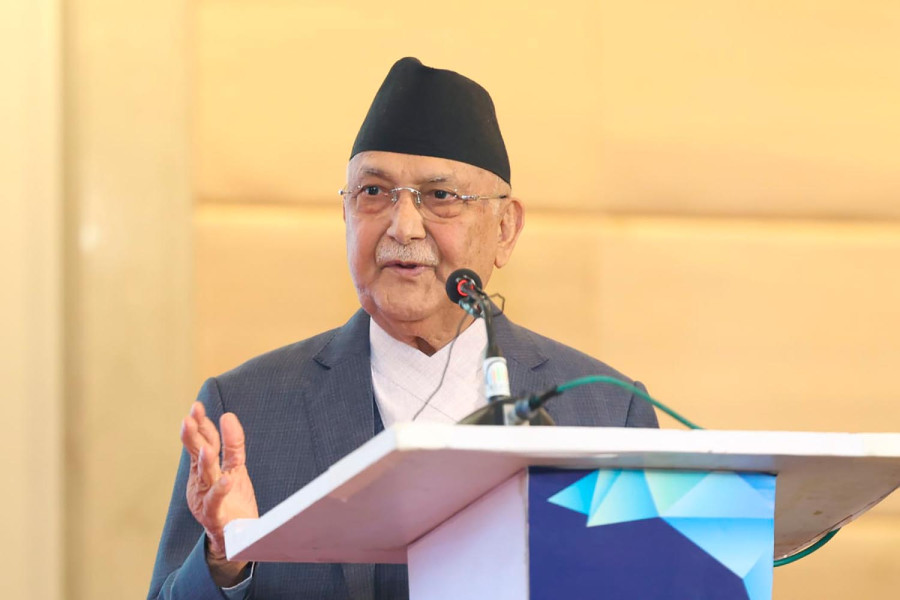Politics
Oli hints his Bangkok meeting with Modi did not go well
During a discussion in Kathmandu, the prime minister skirts around the Bangkok meeting, choosing instead to offer homilies about Nepal’s ‘balanced’ foreign policy.
Post Report
The much-awaited meeting between Prime Minister KP Sharma Oli and his Indian counterpart Narendra Modi in Bangkok on April 4 does not seem to have gone well.
Though Oli, upon his return from Bangkok after taking part in the sixth summit of the Bay of Bengal Initiative for Multi-Sectoral Technical and Economic Cooperation (Bimstec), claimed that there had been a “deep understanding” with Modi to further strengthen Nepal-India relations and address minor disputes through dialogue and mutual understanding.
But by what Oli said on Monday during the inauguration of the Himalayan Dialogue, his bitter ties with New Delhi does not seem to have improved with Modi. The dialogue is a new platform to discuss and brainstorm various issues related to geopolitics, foreign relations, climate change and other contemporary issues led by Gopal Khanal, a member of CPN-UML foreign relations department.
“Foreign relations should be reasonable… and it should serve the national interest,” Oli said. “If a neighbour intends to eat the paddy planted in another neighbour’s field, it cannot be called a neighbour, and so it cannot be called neighborly relations.”
Oli continued, “The genuine concerns of the neighbours should be understood. If three people are common friends, one should not be seen as tilting towards another. We should not tilt towards Peking or Delhi… We have to maintain the policy of non-alignment.”
Many participants present in the programme said they understood that Oli’s meeting with Modi did not go well, otherwise he would not have vented his ire like this.
“If two neighbours quarrel, Nepal will play a balanced role and will say please keep quiet,” Oli added. “If we only say please keep quiet, we may sound like we are tilting to one side. The south may suspect it might be a north tilt, the north might suspect that it might be south tilt.”
“Had his meeting with Modi gone well, he would definitely have praised him,” a long-time foreign policy observer told the Post after the meeting.
Oli’s ties with the Indian establishment started to deteriorate after the map row followed by the boundary disputes between the two countries in 2019-20. In response to India's political map that incorporated the disputed Kalapani, Limpiyadhura and Lipulekh in its territories, Oli, when he was the prime minister, issued a new map in 2020.
Oli again became the prime minister in July last year with the backing of Nepali Congress and since then he has been looking to visit India. To secure an official visit to India, Oli used all possible means to pursue the Indian establishment including by sending his foreign minister Arzu Rana Deuba to India to meet Modi in August but his attempts failed.
In September last year, Oli met Modi on the sidelines of the 79th United Nations General Assembly in New York but that meeting also did not pave the way for his India visit. On Saturday, while returning from Bangkok, Oli told reporters that his meeting with Modi in New York was good.
Even after that meeting, Oli kept trying to visit India but could not succeed. Then, Oli and Modi got a chance to meet in Bangkok on the margins of the Bimstec summit.
They met one-on-one for over 35 minutes. Statements issued by both sides claimed that the meeting went well and they had frank and candid discussion.
But on Monday, Oli went back to his sour note. He did not mention meeting Modi and restored his ‘nationalism’ card.
“There are several ways to preserve national interest. We need balanced relations but geopolitics cannot be an excuse or tool for compromise,” Oli said. “We have to put our position in a clear way. In the name of geopolitics, we cannot compromise or cover up anything that is detrimental to our national interest. Geopolitics is not a tool to cover up your weakness. We should not give up our justifiable national interests.”
Oli also talked about foreign policy being pursued by his government stating that Nepal is in favour of global peace and peaceful resolution of the disputes, will not take any side, and will not be part of any military alliance.
“We are in favour of peace, we are in favour of humanity, regional and global peace. We do not create any enemy and believe in healthy and balanced relations and fair competition. And we have a kind of national consensus on foreign policy too,” said Oli.
While giving an example of consensus-based foreign policy, Oli said the government of Nepali Congress and CPN-UML is trying to resolve domestic crises as well as political transition.
“Whether on domestic issues or foreign policy, we [the UML and Congress] are on the same page. In the United Nations, in Bimstec, in the Belt and Road Initiative, we and Congress are together. We made several agreements in consensus.”
Without unity, no geopolitics, foreign relations or development is possible, said the prime minister. He gave long narrations about how Nepal is a diverse nation but time and again its vulnerability has also been exposed. “During the time of drafting the constitution, we saw our diversity weakening,” he said.
“At one point, during the time of writing the constitution, we thought our geopolitics would give us trouble. But we resolved the crisis. We have faced such crises before and continue to do so, but we have resolved them through unity.”
Only big powers are in a position to take advantage [of small countries], said the prime minister. “But we will defend our security, sovereignty, independence, and national interest,” he said. “There are certain international obligations and we will fulfill them.”




 8.22°C Kathmandu
8.22°C Kathmandu














